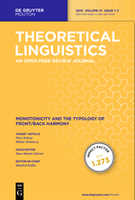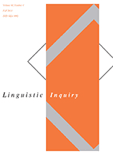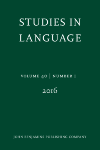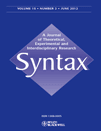
NATURAL LANGUAGE & LINGUISTIC THEORY
Scope & Guideline
Advancing Understanding in Natural Language Research
Introduction
Aims and Scopes
- Syntax and Morphology:
The journal consistently explores the intricacies of syntax and morphology, examining how these components interact within various languages. Papers delve into topics such as argument structure, movement, and agreement phenomena. - Semantics and Pragmatics:
Research on semantics and pragmatics is a core focus, with studies investigating meaning, reference, quantification, and the interplay between linguistic forms and their contextual uses. - Phonology and Prosody:
The journal addresses phonological issues, including prosodic structures, tone, and their effects on syntactic and semantic interpretations, emphasizing cross-linguistic perspectives. - Typological and Comparative Linguistics:
Typological studies are prominent, with an emphasis on cross-linguistic generalizations and comparative analyses that highlight the diversity and commonalities among languages. - Experimental and Computational Approaches:
The integration of experimental and computational methods in linguistic research reflects an innovative approach to understanding language phenomena, allowing for empirical validation of theoretical claims.
Trending and Emerging
- Cross-linguistic Variation and Universals:
There is a notable increase in studies examining cross-linguistic variation and universals, focusing on how different languages manifest similar grammatical phenomena. This trend underscores the importance of understanding language as a universal yet diverse system. - Integration of Experimental Methods:
An emerging theme is the integration of experimental methods, including psycholinguistic and neurolinguistic approaches, to investigate language processing and comprehension, reflecting a broader trend in linguistics towards empirical validation. - Interface Phenomena:
Research exploring the interfaces between syntax, semantics, and phonology is gaining traction, with papers addressing how these domains interact and influence one another, highlighting the complexity of linguistic systems. - Computational Linguistics:
The rise of computational approaches to linguistics, including the use of machine learning and data-driven analysis, indicates an expanding scope that embraces technology and quantitative methods in linguistic inquiry. - Language Change and Historical Linguistics:
There is a growing interest in language change and its implications for current linguistic theories, with researchers examining the dynamics of language evolution and the factors that drive linguistic shifts.
Declining or Waning
- Traditional Syntax-Theoretic Approaches:
There appears to be a waning interest in traditional syntactic theories that do not incorporate empirical data or experimental results, as researchers increasingly favor approaches that integrate theoretical and practical insights. - Descriptive Linguistics:
Papers focused solely on descriptive linguistics, without a theoretical framework or innovative analysis, are becoming less common, indicating a shift towards more analytical and theory-driven studies. - Morphosyntactic Typology:
The exploration of morphosyntactic typology, while still present, has seen a decrease in frequency, possibly due to a growing preference for more specific and detailed analyses rather than broad typological surveys.
Similar Journals

DEUTSCHE SPRACHE
Advancing Knowledge in German Language StudiesDEUTSCHE SPRACHE, published by Erich Schmidt Verlag, is a pivotal journal dedicated to the intricate study of the German language. With its ISSN 0340-9341 and E-ISSN 1866-5233, this publication serves as a vital resource for linguists, educators, and language enthusiasts alike. Spanning diverse topics within the fields of linguistics and language, psychology, and social sciences, the journal has earned a Q3 ranking in Linguistics and Language, alongside a Q4 ranking in both Psychology (miscellaneous) and Social Sciences (miscellaneous) as of 2023. Although the journal is not Open Access, it provides invaluable insights on the developments in German language research from its convergence years of 2002 to 2011 and 2017 to 2023. Positioned in Berlin-Tiergarten, Germany, DEUTSCHE SPRACHE continues to expand its influence and accessibility to researchers, professionals, and students keen on understanding the nuances of linguistic expression in the German language.

SKASE Journal of Theoretical Linguistics
Pioneering New Perspectives in Theoretical LinguisticsSKASE Journal of Theoretical Linguistics, published by the SLOVAK ASSOCIATION STUDY ENGLISH-SKASE, is a distinguished Open Access journal that expands the horizons of linguistic research and theoretical frameworks. With its ISSN N/A and E-ISSN 1336-782X, the journal has established itself as a pivotal resource for scholars in the field, achieving a commendable Q2 ranking in Linguistics and Language as of 2023. The journal, which has been in continuous publication since 2017, actively publishes innovative research studies, reviews, and theoretical discussions, easing access to groundbreaking work for academics and practitioners alike. Based in Slovakia, it connects a rich heritage of linguistic scholarship and is indexed in Scopus, ranking alongside its peers in both Arts and Humanities and Social Sciences categories. The SKASE Journal of Theoretical Linguistics is crucial for anyone interested in the evolving landscapes of linguistics, serving as an invaluable platform for disseminating knowledge and fostering collaboration amongst researchers worldwide.

THEORETICAL LINGUISTICS
Fostering Theoretical Innovation in LinguisticsTHEORETICAL LINGUISTICS, published by Walter de Gruyter GmbH, is a prominent journal dedicated to exploring the intricate dimensions of linguistics, positioning itself as an essential resource for scholars and practitioners in the field. Established in 1974, this Germany-based journal has undergone significant evolution, contributing to the theoretical and empirical understanding of language with a focus on diverse linguistic phenomena. As evidenced by its Q2 ranking in the Linguistics and Language category for 2023, THEORETICAL LINGUISTICS engages with innovative theoretical discussions and methodologies, making it a vital platform for researchers navigating the complexities of language structure and usage. Though not an open-access journal, it ensures accessibility through robust distribution networks, fostering collaboration and knowledge-sharing within the academic community. With a consistent output from 1990 to 2024, this journal stands at the intersection of linguistics and language studies, appealing to a wide audience of researchers, professionals, and students alike.

Language and Linguistics
Advancing Linguistic Knowledge for Tomorrow's ScholarsLanguage and Linguistics is a leading academic journal published by ACAD SINICA, INST LINGUISTICS, based in Taiwan. Established in 2008, this journal has rapidly gained recognition within the field of linguistics, achieving a commendable ranking of Q2 in the 2023 category quartiles and holding positions in the top percentiles of Scopus rankings for both Arts and Humanities and Social Sciences. With an ISSN of 1606-822X and an E-ISSN of 2309-5067, the journal aims to foster the development of linguistics research by providing a platform for the dissemination of innovative and interdisciplinary studies. While it currently operates on a traditional subscription model, its significant contribution to the advancement of linguistic theory and its applications makes it an invaluable resource for researchers, professionals, and students alike. Spanning converged years from 2008 to 2024, Language and Linguistics continues to shape the dialogue in understanding language phenomena and encourages submissions that push the boundaries of current linguistic knowledge.

Glossa-A Journal of General Linguistics
Catalyzing Critical Discourse in Language StudiesGlossa: A Journal of General Linguistics, published by the Open Library of Humanities, stands as a leading voice in the realm of linguistic research since its inception in 2016. With its Q1 category ranking in Linguistics and Language and impressive Scopus ranks encompassing the top 83rd and 81st percentiles in its respective fields, Glossa fosters a vibrant academic community committed to the rigorous exploration of language and linguistic theory. Operating under an open access model, the journal not only enhances the visibility of groundbreaking research but also ensures that valuable insights are accessible to a global audience. The journal's commitment to interdisciplinary dialogue makes it an indispensable resource for scholars, professionals, and students eager to engage with contemporary developments in linguistics. As it converges into 2024, Glossa continues to champion innovative scholarship and critical discourse that challenges conventional boundaries within the field.

Voprosy Yazykoznaniya
Illuminating the Landscape of Language StudiesVoprosy Yazykoznaniya, published by the esteemed Russian Academy of Sciences and the State Academy of Humanities (GAUGN), stands as a leading journal in the field of linguistics and language studies. With an impressive Q2 rank in Linguistics and Language for 2023 and a strong position within Scopus rankings, this journal fosters scholarly dialogue and pushes the boundaries of linguistic research by providing a platform for innovative studies, reviews, and analyses. Although not open access, its publication ensures high academic standards and visibility within the global academic community. Researchers, professionals, and students alike can benefit from the rich insights and diverse perspectives presented in this journal, serving as a vital resource for anyone interested in the intricacies of language and its role in society. Operating since 2009 and continuing to 2024, Voprosy Yazykoznaniya is an essential reference point for contemporary linguistic scholarship in the Russian Federation and beyond.

LINGUISTIC INQUIRY
Connecting Scholars through Language ExplorationLINGUISTIC INQUIRY is a premier journal published by MIT PRESS, representing a critical platform for the advancement of research in the fields of linguistics and language studies. With an impressive Q1 category ranking in both linguistics and language disciplines for 2023, and ranking #149 in Arts and Humanities and #174 in Social Sciences according to Scopus metrics, this journal stands at the forefront of academic conversations around language theory, analysis, and application. LINGUISTIC INQUIRY caters to a diverse audience of researchers, professionals, and students, providing a robust forum for original research articles and theoretical discussions that push the boundaries of our understanding of language. While the journal currently does not offer open access, it remains an essential resource for those engaged in cutting-edge linguistic research. The journal's continuous publication since 1996 demonstrates its long-standing commitment to linguistic scholarship and innovation.

Italian Journal of Linguistics
Navigating the evolving field of linguistics with authority.Italian Journal of Linguistics is a prominent academic journal published by PACINI EDITORE, dedicated to advancing the understanding of linguistic theory and application. With its inception in 1996, the journal has fostered scholarly discourse and continues to contribute to the field through rigorous peer-reviewed articles. Operating under the prestigious field of linguistics, the journal currently holds a respectable Q3 quartile ranking as of 2023, showcasing its relevance in the academic community. It also ranks in the top 30% of journals in both Arts and Humanities and Social Sciences disciplines, reflecting its impactful contributions documented in Scopus rankings. While the Italian Journal of Linguistics is not an open-access journal, it offers invaluable insights and innovative research findings, making it an essential resource for researchers, professionals, and students keen on exploring the nuances of language and linguistics. Based in Pisa, Italy, the journal serves as a significant platform for both contemporary studies and classic investigations in linguistics, appealing to an international audience devoted to this ever-evolving field.

STUDIES IN LANGUAGE
Connecting Cultures through Language and CommunicationSTUDIES IN LANGUAGE is a distinguished academic journal published by John Benjamins Publishing Co, focusing on the dynamic fields of Linguistics and Communication. With an ISBN of 0378-4177 and E-ISSN 1569-9978, this journal has become an essential platform for researchers, professionals, and students seeking to advance their understanding of language and its multifaceted dimensions. The journal has been recognized in 2023 with a prestigious Q1 categorization in Linguistics and Language and a Q2 ranking in Communication, reflecting its vital contributions to these fields. Its Scopus rankings further emphasize its relevance, ranking 299 out of 1088 in Language and Linguistics, positioning it within the 72nd percentile. Published continuously since its inception in 1977, STUDIES IN LANGUAGE plays a pivotal role in disseminating cutting-edge research and fostering academic dialogue around contemporary linguistic theories and communication practices. While it is not an open-access journal, it offers valuable insights that make it a must-read for anyone committed to exploring the intricate relationships between language, culture, and society.

Syntax-A Journal of Theoretical Experimental and Interdisciplinary Research
Fostering Cutting-Edge Research in Theoretical and Experimental LinguisticsSyntax - A Journal of Theoretical Experimental and Interdisciplinary Research is a premier journal dedicated to advancing the field of linguistics, serving as a platform for high-quality research that spans theoretical, experimental, and interdisciplinary dimensions. Published by Wiley and located in the United Kingdom, this journal holds a prestigious Q1 ranking in the Linguistics and Language category as of 2023, highlighting its significance and impact within the academic community. With an impressive Scopus ranking of Rank #204/1088 in Arts and Humanities and Rank #239/1167 in Social Sciences, the journal occupies an influential position among leading publications, appealing to researchers, professionals, and students alike. Syntax encourages innovative studies that contribute to our understanding of language structure and use, making it an essential read for anyone invested in linguistic research. Although the journal is not Open Access, its commitment to rigorous scholarship ensures that it remains a vital resource for those exploring cutting-edge theories and empirical findings in the dynamic field of linguistics.